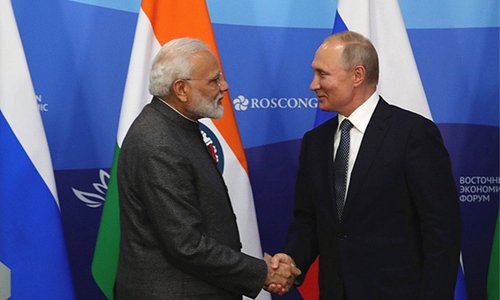HOME >> OPINION
India-Russia ties rest on strategic calculations
By Hu Zhiyong Source:Global Times Published: 2019/9/16 21:43:39

Russian President Vladimir Putin and Indian Prime Minister Narendra Modi shake hands in Vladivostok, Russia, Sept 4, 2019. (Kremlin Photo)
Indian Prime Minister Narendra Modi's visit to Russia and participation in the 5th Eastern Economic Forum (EEF) in the far-eastern Russian city of Vladivostok earlier this month underscore efforts to develop symbiotic relations between the nations.
Modi held talks with Russian President Vladimir Putin on September 4, during which they discussed the potential to develop cooperation in fields such as oil and gas, mining, nuclear energy, defense and security, trade and investment. The two sides signed 25 deals, covering fields like defense, air and maritime connectivity, energy, natural gas, petroleum and trade. The two leaders also attended the 20th India-Russia Annual Summit.
Close cooperation between Moscow and New Delhi in military and military-technical areas is a pillar of bilateral Special and Privileged Strategic Partnership. Both countries also joined hands in developing the BrahMos missile. Russia has been India's biggest arms supplier. India has ordered $14.5 billion of weapons from Russia since 2018. Besides the $5 billion S-400 surface-to-air missile systems, both countries also signed deals last year to deliver 11356 frigates.
Both countries will engage in joint military research and development. Dmitry Shugayev, head of Russian Federal Service for Military-Technical Cooperation, expressed the hope that Moscow and New Delhi will sign contracts to jointly produce Kalashnikov assault rifles AK-203 and Ka-226 helicopters by the end of 2019. The two countries also discussed the "possibility of setting up joint ventures in India that would design and build passenger aircraft." Modi also accepted the invitation by Putin to attend the 75th anniversary celebrations of Russia's victory in WWII in Moscow in May 2020.
Russia and India are not far apart in the political realm. India is one of the pivotal partners of Russia. Both sides need a multi-polar world. India and Russia should bolster cooperation in organizations like BRICS and the Shanghai Cooperation Organization (SCO) and coordinate their positions within multilateral institutions, such as the United Nations, G20, SCO and BRICS.
The joint statement issued by the 20th India-Russia Annual Summit says "Russia will continue to support India's candidacy for the permanent membership of a reformed UN Security Council" and "Both sides called for reform of the UNSC to reflect contemporary global realities."
India proactively promoted "multilateral diplomacy," taking advantage of the contradictions between great powers to obtain maximum strategic interests. Modi proposed trilateral cooperation among India, Russia and Japan in developing the Russian Far East on the eve of the EEF which was interpreted by observers as an attempt to challenge China's economic clout in the region.
India boosts "balanced diplomacy" by strengthening its cooperation with Russia. Despite the rift between Japan and Russia over sovereignty claims on the islands, known as Kuril Islands in Russia and the Northern Territories in Japan, Tokyo, like New Delhi, harbored strong interests in participating in the EEF.
In the joint statement, both Russia and India said that the Iran nuclear issue "should be resolved peacefully and through dialogue" and emphasized "their determination to continue mutually beneficial and legitimate economic and commercial cooperation with Iran."
In terms of trade and economy, the trade volume between India and Russia stood at $11 billion in 2018, a small scale but with huge potentials. Besides close cooperation in military, Russia said on September 4 that it is planning to set up over 20 nuclear power units in India in two decades.
Modi is the first Indian Prime Minister to visit the Far East Region of Russia, showing the reinforcement of India-Russia bilateral ties.
Russia and India have their own calculations to deepen cooperation. India hopes to obtain a higher international status and achieve more discourse power; while Russia wants to expand its diplomacy so as to break through Western sanctions and blockades by cooperating with developing countries, such as India.
The advance of India-Russia ties will push the multi-polarization of international relations and reinforce India's role in Asia. It will also add the leverage of Russia to counter Western pressures on diplomacy and security, empower Russia to effectively resist Western countries' strategic blockade and defend its strategic and economic interests in South Asia.
However, stronger Russia-India ties, especially their military-technical cooperation, would have a negative impact on China's national security. Consolidating and developing ties with Russia implies India's strategic intention to contain China's rise. It would pile more geopolitical pressure on China and increase the instability in China's periphery.
The author is a research fellow at the Institute of International Relations, Shanghai Academy of Social Sciences. opinion@globaltimes.com.cn
Posted in: ASIAN REVIEW